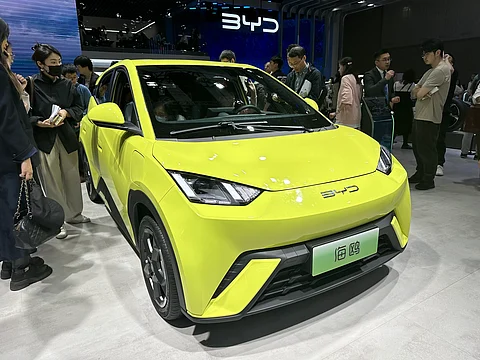

Once known as a nation of bicycles, China has now become the world leader in electric vehicles (EVs). In Guangzhou, a city of over 1.8 crore people, the roar of rush hour traffic has softened into a quiet hum, a reflection of the country's shift to electric mobility.
According to auto sector analyst Michael Dunne, China is not only a decade ahead of other countries in the EV space but also significantly more advanced in implementation. This leadership is symbolised by BYD, the Chinese carmaker that overtook US rival Tesla earlier this year to become the world's top EV seller.
BYD's ascent has been powered by a vast domestic market of more than 1.4 billion people. The company—and numerous other start-ups producing affordable EVs—are now setting their sights on global markets. But how did China establish such dominance in a field traditionally led by Western automakers?
Many analysts trace the roots of China’s EV strategy to Wan Gang, a German-trained engineer who served as China's minister of science and technology from 2007. Dunne has explained that Wan recognised China had become the world’s largest car market but was still dominated by foreign brands. With local automakers unable to match the quality and prestige of their Western, Japanese, or Korean counterparts in petrol and diesel vehicles, Wan proposed a radical shift: leapfrog the internal combustion engine and focus on electrification.
Although China had included EVs in its five-year economic plans since 2001, major support came only in the 2010s, when the government began channelling vast subsidies into the sector. Unlike Western democracies, China was able to mobilise long-term resources with national-level coordination. From 2009 to the end of 2023, Beijing is estimated by the Centre for Strategic and International Studies (CSIS) to have spent about $231 billion developing the EV industry.
This funding supported not just consumers and carmakers but also electricity providers and battery manufacturers. It helped BYD pivot from smartphone batteries to EVs and enabled battery giant CATL—founded in 2011 in Ningde—to grow into a global leader, now producing about one-third of all EV batteries worldwide.
China also used this strategy to secure dominance over key supply chains and infrastructure. The country now operates the world’s largest public EV charging network, with charging stations densely concentrated in urban areas.
Dunne has observed that any company attempting to manufacture an EV battery today must inevitably interact with China, given its control over raw materials, processing, and production. Some describe this system as state capitalism. Western observers often label it an unfair advantage, though Chinese executives reject that characterisation.
EV manufacturers in China argue that the same resources are accessible to both domestic and foreign companies. Brian Gu, president of XPeng, has pointed out that Chinese policy support mirrors those in Europe and the US, but is applied more consistently and without favouritism, leading to a highly competitive and innovative ecosystem.
XPeng, one of the country’s rising EV champions, exemplifies this innovation. Despite being less than a decade old and yet to turn a profit, it ranks among the top 10 EV producers globally. The company has become a magnet for young talent and reflects China’s fusion of industrial ambition with Silicon Valley-style culture.
Still, Gu has admitted the pressure is intense: Chinese companies must continuously deliver better cars at lower prices. XPeng's new Mona Max, priced around $20,000, offers self-driving capabilities, voice control, lie-flat seats, and streaming services—features young Chinese consumers now consider standard in their first vehicles.
Government spending has not just supported production; it has also spurred demand. Consumers receive subsidies when switching from petrol to electric cars, enjoy tax exemptions, and benefit from discounted rates at public chargers.
Private-hire driver Lu Yunfeng, for instance, switched to an EV two years ago. His fuel cost dropped to a quarter of what he used to pay, and he received a free registration plate—normally a costly item in many Chinese cities.
Lu remarked that while wealthier drivers may still prefer petrol cars, EVs made far more sense for people like him. Another EV user in Shanghai, who gave her name as Daisy, said she preferred battery-swapping technology offered by Nio, which enables drivers to get a fully charged battery in under three minutes—faster and cheaper than a traditional fuel refill.
Despite China's success, its approach has drawn international scrutiny. Governments in the US, Canada, and the European Union have imposed steep import duties on Chinese EVs, citing concerns over state subsidies and unfair competition.
The UK, however, has not followed suit, making it an appealing market for firms like XPeng and BYD, both of which recently launched models in Britain priced as low as $26,100. With countries such as the UK set to ban petrol and diesel car sales by 2030, China is well positioned to supply the EVs that will replace them.
Dunne has observed that Chinese manufacturers now see themselves as capable of producing cars for the entire world—and are questioning whether any global rival can match their scale and efficiency. In his view, industry leaders in Detroit, Nagoya, and across Europe are starting to recognise this shift.
Yet, for all the environmental advantages, concerns remain over the risks of depending on Chinese technology. BYD executive vice-president Stella Li dismissed the warning as baseless, saying that the company invests heavily in data security, uses local data carriers, and surpasses rivals in privacy standards. She suggested such criticisms often emerge from those who feel they are losing their edge.
This debate echoes earlier controversies surrounding Huawei and TikTok—Chinese technology that raised alarms in Western capitals over data security and geopolitical risk.
However, Chinese engineers say with a laugh that the world should be thankful to China for pioneering this technology.